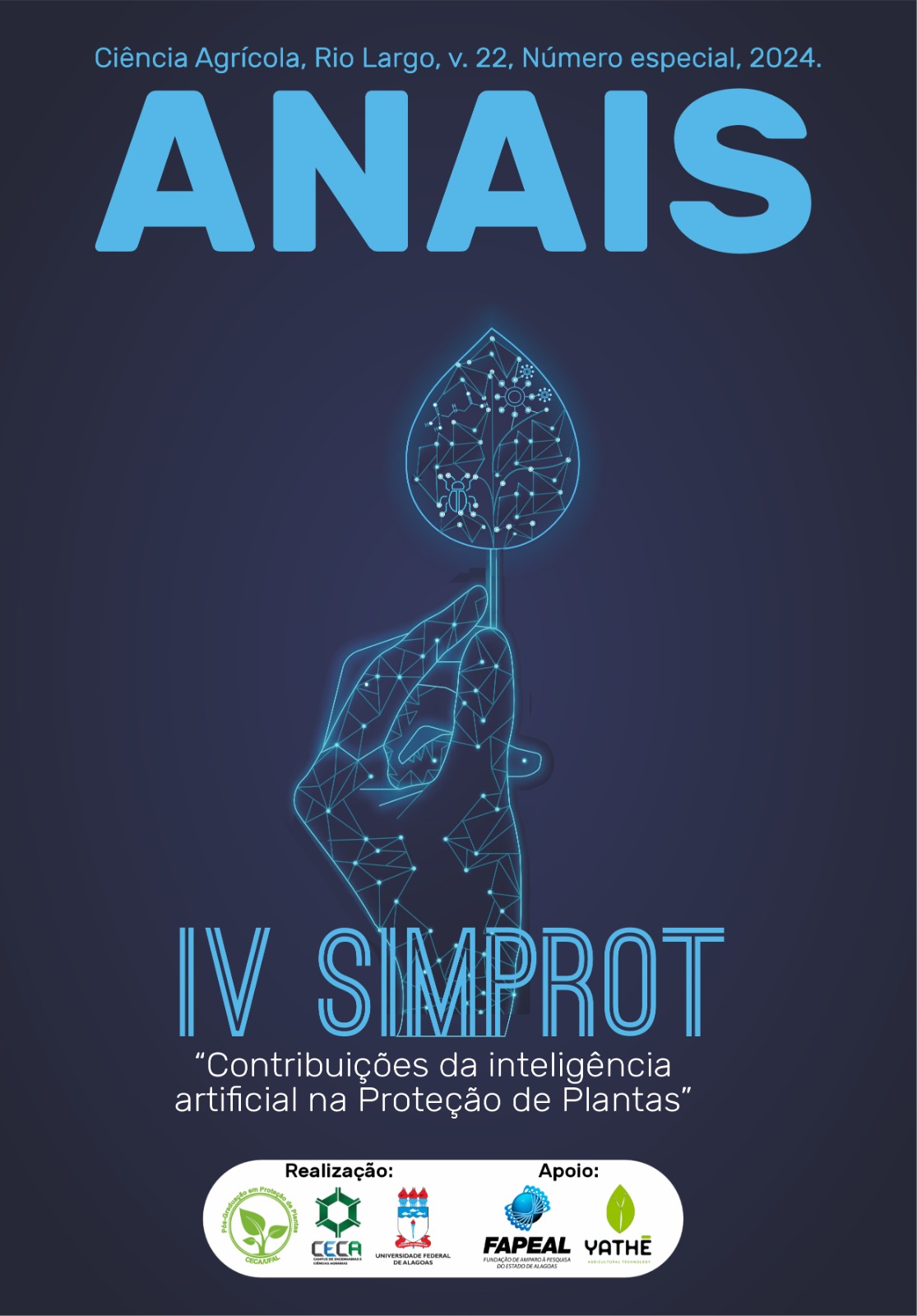TOXICITY OF FIVE ESSENTIAL OILS ON Planococcus citri NYMPHS
DOI:
https://doi.org/10.28998/rca.22.18607Keywords:
Pests, Essencial oil, cochineal, Alternative controlAbstract
Planococcus citri, known as mealybug, is a pest that affects crops such as citrus and grapevines, causing damage to plants and reducing production. Although chemical control, with the use of specific insecticides, is widely used, its indiscriminate use can lead to the development of resistance in the pest, reducing the effectiveness of the products. The objective of this study was to evaluate the toxicity of fennel, peppermint, cloves, citronella and lemongrass essential oils on P. citri nymphs. The bioassays were conducted at the Laboratory of Alternative Pest Control Entomology (LECAP) of the Federal University of Alagoas (CECA/UFAL), in Rio Largo, AL. Five replicates were performed per treatment, with 10 nymphs per replicate. At a concentration of 30 μL/mL, each replicate received 2.3 mL of the respective treatment with the help of the Potter's tower. After 48 hours, the number of dead nymphs was evaluated. Most of the essential oils, at the tested concentration, showed efficacy in the mortality of P. citri nymphs.
Downloads
References
Agrofit. Sistemas de agrotóxicos fitossanitários. 2021.
Bruna, R. Cochonilha: entenda o que são, principais famílias, como identificar, quais culturas são afetadas e manejo mais recomendado para o controle, 2022.
Freire, M. M. Composição e atividade antifúngica do óleo essencial de hortelã-pimenta (Mentha piperita L.). 2006. 67p. Dissertação (Mestrado em agroquimica) – Universidade Federal de Viçosa, Viçosa, 2006.
Gravena, S. Cochonilha Branca: descontrolada em 2001. Laranja, 2003, 24, 71-82.
Lana, M. M.; Tavares, S. A. (Ed.). 50 Hortaliças: como comprar, conservar e consumir. 2. ed. rev. Brasília, DF: Embrapa Informação Tecnológica, 209, 2010.
Lorens, J.M. Homoptera l – Cochinillas de los cítricos y su control biológico Valencia: Pisa Ediciones, 260, 1990.
Ootani, M. A et al. Use of essential oils in agriculture. Jornal of biotechnology and biodiversity, 2013.
Pinto, A. S.; Parra, J. R. P.; Botelho, P S. M.; Correa-Ferreira B. S.; J. M. (Ed). Controle biológico no brasil: parasitoides e predadores. São Paulo: Manole, 325-342, 2002.
Siqueira, L. C.; Telo, B.; Wolkmer, P. Estudo sobre o uso do óleo de Mentha piperita no combate ao carrapato Rhipicephalus sanguineus. Universidade de Cruz Alta, 2024.
Downloads
Published
Issue
Section
License
Copyright (c) 2024 Yara da Silva

This work is licensed under a Creative Commons Attribution 4.0 International License.
Termo de cessão de direitos autorias
Esta é uma revista de acesso livre, em que, utiliza o termo de cessão seguindo a lei nº 9.610/1998, que altera, atualiza e consolida a legislação sobre direitos autorais no Brasil.
O(s) autor(es) doravante designado(s) CEDENTE, por meio desta, cede o direito de primeira publicação da OBRA à Revista Ciência Agricola, representada pelo Centro de Ciência Agrarias da Universidade Federal de Alagoas, estabelecida na BR 104 Norte, Km 35, Rio Largo, Alagoas, CEP 57100-000 doravante designada CESSIONÁRIA, nas condições descritas a seguir:
O CEDENTE declara que é (são) autor(es) e titular(es) da propriedade dos direitos autorais da OBRA submetida.
O CEDENTE declara que a OBRA não infringe direitos autorais e/ou outros direitos de propriedade de terceiros, que a divulgação de imagens (caso as mesmas existam) foi autorizada e que assume integral responsabilidade moral e/ou patrimonial, pelo seu conteúdo, perante terceiros
O CEDENTE mantêm os direitos autorais e concedem à revista o direito de primeira publicação, com o trabalho simultaneamente licenciado sob a Licença Creative Commons do tipo atribuição CC-BY, para todo o conteúdo do periódico, exceto onde estiver identificado, que permite o compartilhamento do trabalho com reconhecimento da autoria e publicação inicial nesta revista, sem fins comerciais.
O CEDENTE têm autorização para distribuição não-exclusiva da versão do trabalho publicada nesta revista (ex.: publicar como capítulo de livro), com reconhecimento de autoria e publicação inicial nesta revista.
O CEDENTE têm permissão e são estimulados a publicar e distribuir seu trabalho online (ex.: em repositórios institucionais ou na sua página pessoal), já que isso pode gerar alterações produtivas, bem como aumentar o impacto e a citação do trabalho publicado.




